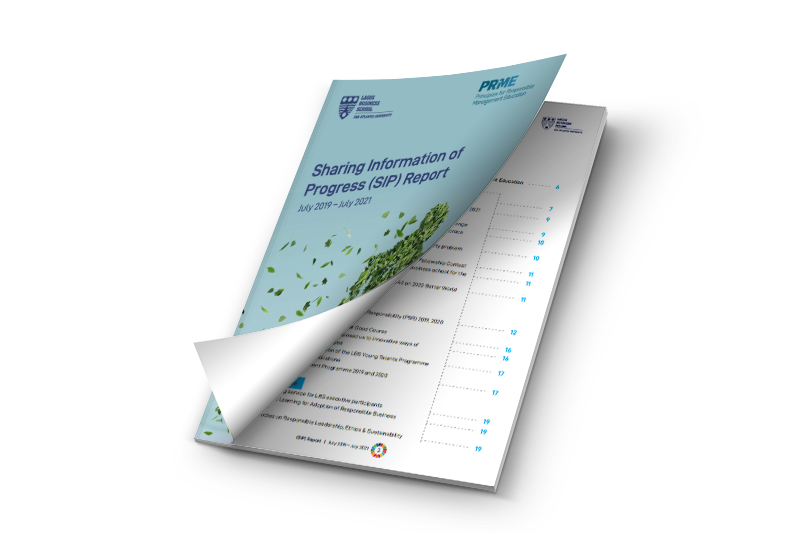Sustainability Integration for Small and Medium Enterprises (SMEs) – Toolkit
Sustainability takes different forms of operational models depending on the business context. At the heart of it all is a strategic focus on running the business in a manner that provides added value for stakeholders as well as financial value for shareholders and promoters.
This toolkit is a guide on the simple but impactful ways to integrate sustainability in Small and Medium Enterprises (SMEs). The tool kit employs the 4 categories of Corporate Sustainability namely (1) Marketplace – Products, Services, and Business Practices ; (2) Workplace – Organisational Culture; (3) Community – Social projects and interventions; and (4) Environment – Use of Natural Resources and footprint of business operations.

A Review of Corporate Sustainability Practice in Africa – Insight Report Series
Corporate sustainability is a holistic approach to conducting business while achieving environmental, social, and economic (including financial) goals and managing ‘footprint’ to create more value for all stakeholders.
It is common knowledge that Africa is faced with societal challenges slowing the prosperity of her people and her economy leaving many organisations, governments and communities puzzled as to the best approach needed to tackle these seemingly insurmountable problems. In this insight series, LBSSC’s team of experts and researchers explore the various ways businesses on the continent are embedding sustainability. Parts 1 and 2 take a deep dive into Creating Shared Value (CSV), a concept invented by Harvard professors Kramer and Porter and how it is currently practised using case studies of select organisations in Africa.
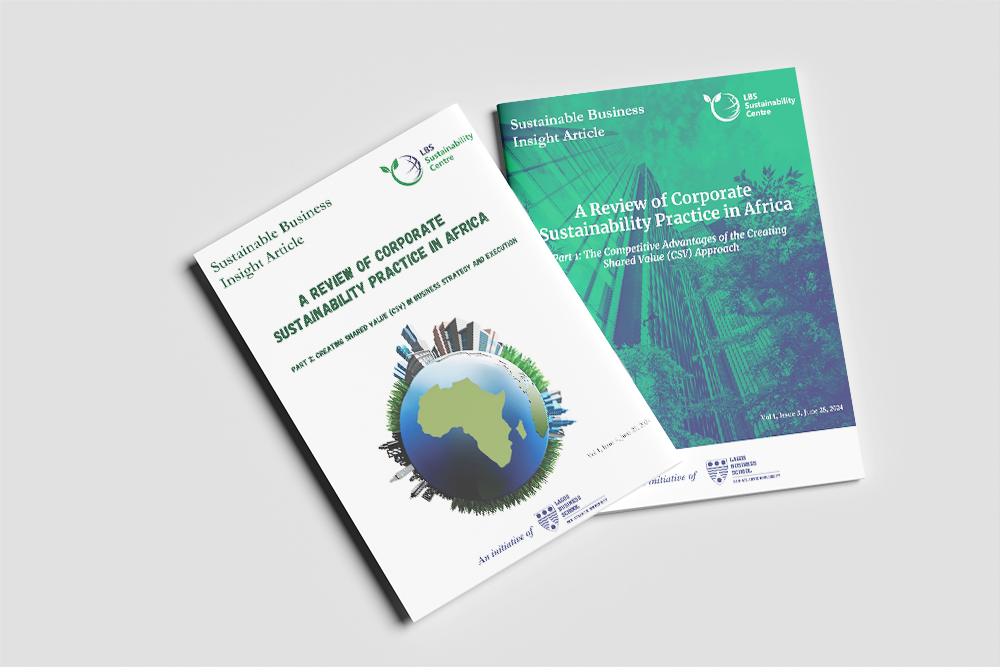
This insight articles series highlights organisations in Africa that have prioritised applying sustainability thinking in business strategy and their approach to societal impact alongside profitability. Part 1 and Part 2 focus on companies practicing the ‘Creating Shared Value’ approach to corporate sustainability. The extent to which organisations grasp the delicate interplay between profit and purpose will define the future of responsible business on the continent. Organisations that master this balance will not only thrive economically, they will become great stewards of the environment and contribute positively to society. As businesses navigate the challenges of the continent, it is worthy of note that purpose and profit can be powerful allies in shaping the Africa We Want.
The Africa Corporate Sustainability Champions – Case Series
Organisations in Nigeria are starting to appreciate the sustainability dimension to their activities, although as a nation, we still have some way to go. This is why I am pleased that the LBS Sustainability Centre is taking the initiative to document the experiences of organisations who are some way on their sustainability journey, to present their understandings and interpretations of sustainability in their organisations, the benefits they have had on their local communities and the lessons learnt from their journey.
It is anticipated that these are experiences from which other organisations in Nigeria and beyond, may be able to learn from, as they consider how they too can imbue the sustainability agenda in their own businesses.
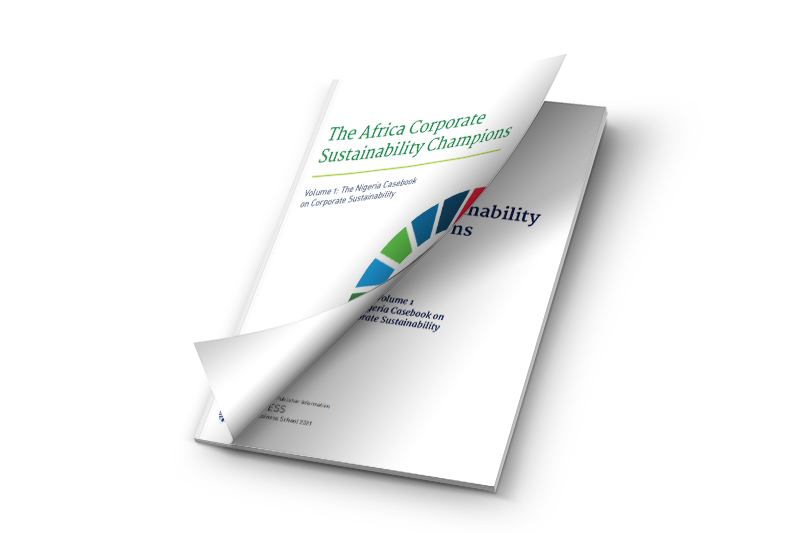
Business and Sustainability Development in Nigeria, The Banking Industry
The main objective of this report, Business and Sustainable Development in Nigeria: The Banking Industry, is to present a business-relevant resource on corporate sustainability practices in Nigeria’s banking industry. It is a practical resource for banks, business executives, investors, market analysts, regulators, academics and the public. It is designed to provide information on sustainability trends, efforts to address sustainable development in the banking industry, as well as related challenges and opportunities.
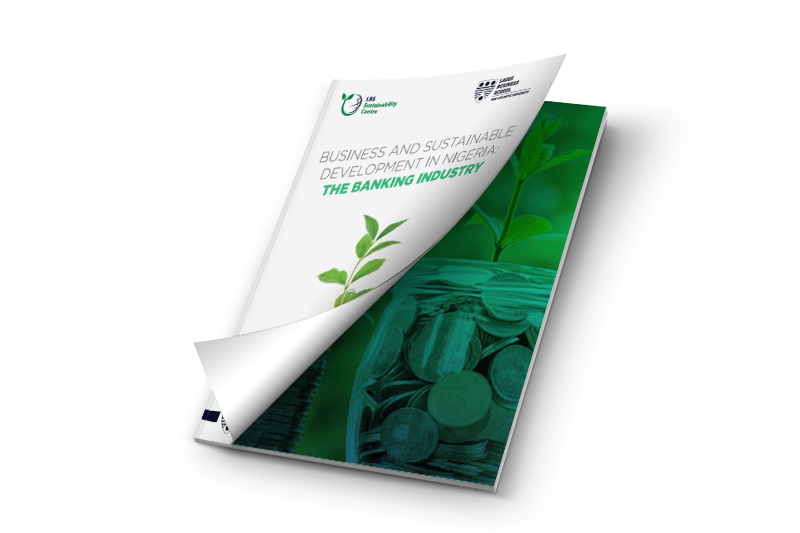
Research Projects and Publications Supported
- Ongoing: Investigation of the Contribution (s) of the Non-Profit Sector to African Economies with specific focus on the creation of dignified and fulfilling work for young people in Africa. This 5-Year Research Project is led by the WITS Business School’s Centre for African Philanthropy and Social Investment (CAPSI) and LBS Sustainability Centre is the Research Partner for Nigeria. The Nigeria Project team is led by Orevaoghene I. Atanya and Paul Appiah-Konadu PhD. The project is supported by the Mastercard Foundation.
- Ogbechie, C. I., Atanya, O. I. Jones, S. and Onoyima N. J. (2024) The Nigerian Conservation Foundation (NCF): Re-Greening Nigeria through the Green Recovery Nigeria (GRN) Programme. Case Study, LBS Case Centre
- Akanji, M., Amoah, N., Akpoveso, O. T., Atanya, O., & Ogbechie, C. (2023). A Review of the Circular Economy in Nigeria: From rhetoric to enterprise development. The Routledge Handbook of Catalysts for a Sustainable Circular Economy, 88-106.
- Ogunyemi, K. Atanya, O. and Burgal, V. (2022) (Eds) Management and Leadership for a Sustainable Africa, Volume 2: Roles, Responsibilities, and Prospects. Palgrave Studies in African Leadership. Springer International Publishing
- Ogunyemi, K. Atanya, O. and Burgal, V. (2022) (Eds) Management and Leadership for a Sustainable Africa, Volume 3: Educating for Sustainability Outcomes. Palgrave Studies in African Leadership. Springer International Publishing
- Nwagwu, I. D., Atanya, O. I., & Onuzo, N. (2021) Wecyclers Roll Out: Bilikiss Adebiyi-Abiola. Emerald Publishing.
- Ogbechie C. I., Atanya, O. I., Kelilume, I., Ngwu, F. N., Onoyima, N. & Appiah-Konadu, P. (2020) Sector Mapping and Support Modeling for Argo-Service Providers (ASPs) in Nigeria. International Fund for Agricultural Development
- Ngwu, F. N., Ogbechie C. I. & Atanya, O. I. (2018) Insurance Penetration in Sub-Saharan Africa: Issues, Challenges and Prospects. In P. I. Nyaronga & E. F. Wamboye (Eds.), The Service Sector and Economic Development in Africa. Routledge-Taylor and Francis: London, United Kingdom.
- Ogbechie, C. I., & Atanya, O. (2018) The Kidney Angels: Adcem Pharmaceuticals. Case Study, LBS Case Centre
Annual and Programme Reports
LBS Sustainability Centre Annual Reports
Every year we report on the Centre’s programmes and initiatives and share the stories of impact achieved. We are glad for your support, loyalty and commitment and would like to share with you our reflections, learnings and accomplishments.
View the reports below to learn more about how the Lagos Business School Sustainability Centre achieves the goal of bringing together theory and practice of sustainability through courses, research and dialogue forums all centred on four thematic areas – (1) Corporate Sustainability, (2) Responsible Business & Leadership, (3) Circular Economy, (4) Nonprofit & Social Enterprise Management, and (5) Public Policy for Sustainable Development. Through strategic engagement with corporates, leading NGOs, LBS Faculty and expert facilitators, our committed team members designed and delivered various programmes for business executives, nonprofit leaders, sustainable waste managers, media personnel, business students, etc.
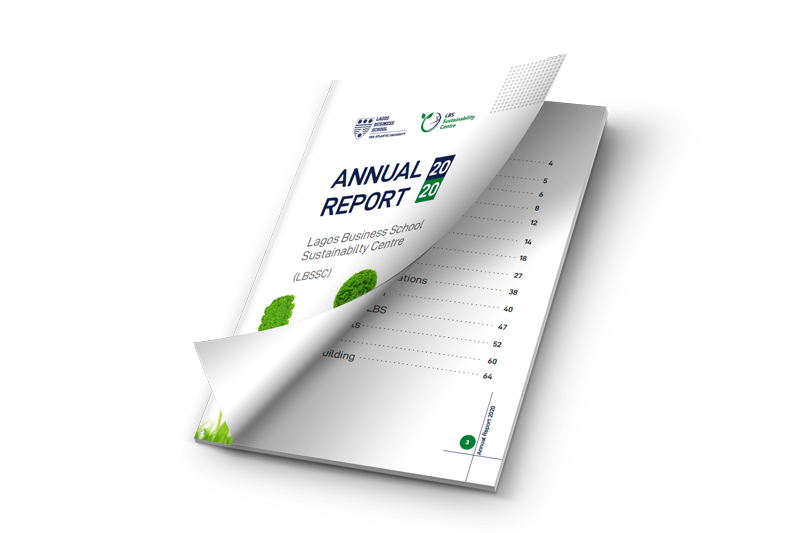
Building Youth Leadership Capacity in Nonprofit Management – Programme Impact Reports
Recognising the need to build the capacity of youth in the nonprofit sector, LBS Sustainability Centre with the support and guidance of the Ford Foundation developed and implemented the project ‘Building Youth Leadership Capacity in Nonprofit Management’. The project began in June 2017 and has led to the development of a certificate programme for youth in the sector, Nonprofit Leadership and Management Programme (NPLM). The project has also connected youth to experienced mentors through the senior fellows in residence programme and the participation of industry experts as facilitators which is an integral part of NPLM.
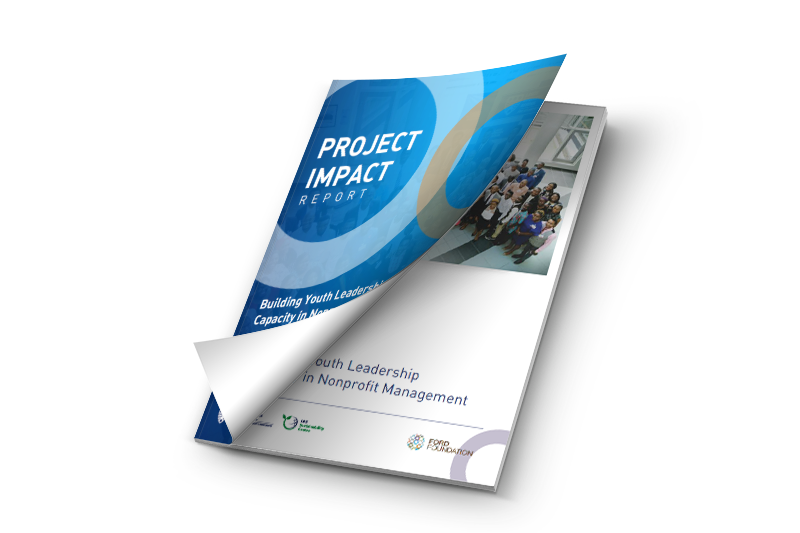
LBS Progress Reports on the UN PRME
Lagos Business School has been a signatory to the UN Principles for Responsible Management Education (PRME) since 2011 and remains committed to the principles. We use the 7 Principles as a tool to assess our advancement of responsible management and sustainability from programmes delivered to the way our campus operates and to the causes we promote across the continent and the globe. Click the reports below to learn about the Principles of Responsible Management Education and how they align with our mission and strategic focus on service to the community and impact.
